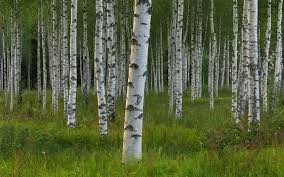
记忆方法
为了记忆“birch”,可以将它与“beach”(海滩)结合起来,两者在发音上相似。想象一个海滩上有高高的白桦树(birch),形成了一幅独特的画面,这样可以帮助你记住单词“birch”是指白桦树。
以上内容由AI生成, 仅供参考和借鉴
中文词源
birch 桦树,白桦
来自PIE *bher, 发光,同bright, 明亮的。
英语词源
- birch
-
birch: [OE] Old English bi(e)rce came from a prehistoric Germanic *berkjōn, source also of German birke. The word goes back ultimately to an Indo-European *bhergo, but as is often the case with ancient tree-names, it does not denote the same type of tree in every language in which it has descendants: Latin fraxinus, for example, means ‘ash tree’. It has been speculated that the word is related to bright (whose Indo-European source was *bhereg-), with reference to the tree’s light-coloured bark.
It could also be that the word bark [13] itself is related. The verb birch ‘flog’ (originally with a birch rod or bunch of birch twigs) is early 19th-century.
=> bark, bright - birch (n.)
- Old English berc, beorc (also the name of the rune for "b"), from Proto-Germanic *berkjon (cognates: Old Saxon birka, Old Norse börk, Danish birk, Swedish björk, Middle Dutch berke, Dutch berk, Old High German birihha, German Birke), from PIE *bhergo (cognates: Ossetian barz, Old Church Slavonic breza, Russian bereza, Lithuanian beržas, Sanskrit bhurjah, Latin farnus, fraxinus "mountain ash"), from root *bhereg- "to gleam, white." Meaning "bunch of birch twigs used for flogging" (1640s) led to verb meaning "to flog" (1830). Related: Birched; birching. Birch beer is by 1827, American English.
权威例句
- 1. a grove of birch trees
- 白桦树丛
- 2. We found that birch bark could serve as paper.
- 我们发现桦树皮可以作纸用.
- 3. They've got a wonderful birch in the back garden.
- 他们在后花园有一棵极好的桦树.
- 4. The birch is still considered a protection against evil spirits by some people in northern Europe.
- 一些北欧人仍然认为白桦可以辟邪。
- 5. Birch trees sprouted from the rubble and grew into a dense young wood.
- 桦树从瓦砾中长出来,形成了一片茂密的新林。